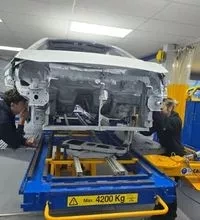Q&A: Mel Rogers of Sytner Group

In this article: MotorPro sits down with Sytner’s director of human resources to discuss training, education and apprenticeships
What are the key education and training requirements for people entering your company?
The Sytner Group has an overriding commitment to developing talent and building careers. Technical roles such as vehicle technician and bodyshop technician require entry-level training qualifications, however, if applicants do not have the skills and training, the company offers apprenticeships for those looking to join the automotive industry.
Many roles available throughout the dealerships, such as host or sales executives, do not require previous industry experience or specific qualifications, applications are welcome from individuals with great attitude, personality and the willingness to learn and develop.
How do you source talent for your organisation?
As part of its commitment to building careers, the group’s aim is to promote from within. However, all jobs are also advertised on the Sytner Careers website, on external job boards and on social media.
Sytner also advertise vacancies on diversity friendly job boards such as Working Mums, allowing them to receive a diverse pool of applicants. All adverts contain wording that is gender friendly and does not contain any linguistic gender bias. Each advert also contains a flexibility statement so that applications have transparency on working patterns.
What apprenticeship training schemes do you carry out?
There is high investment in apprenticeships for key roles in sales, F&I, aftersales, accounts and administration. As you would expect in this industry, investment in technical apprenticeships is extremely high and crucial. A constant pipeline of high calibre, superbly trained technicians is vital for the success of an award winning dealer group such as Sytner.
What is the aim of this training?
Apprenticeships and trainee schemes are seen as adding great value to the long-term talent pipeline. The training is grounded in giving every apprentice the tools and guidance to learn and to be successful. The aim is always to help apprentices become proficient in their role while constantly developing their skills and talent.
What impact did the apprenticeship levy have on your business?
It’s right to focus on apprenticeships and the up-skilling of our workforce. However, it’s undeniable the levy has been marked with criticism and confusion since its introduction in 2017. We would agree the levy has had its challenges for us but treating the levy as a tax as other companies have chosen to do was never an option for us.
The new apprenticeship standards provide our apprentices with high-valued skillsets that are much more tailored to the industry, aligning day-to-day activities with quality learning. It’s also great that we can now support our other colleagues who want to develop their careers and skillset, by allowing them to undertake new apprenticeships that are funded through the levy with the removal of age restrictions under the levy reform.
How are you managing the new skill requirements for the switch to plug-in vehicles?
It is exciting times in terms of the changing face of vehicle manufacture. With the switch to plug-in and electric vehicles, training of colleagues starts with their passion to learn and be involved.
Manufacturers provide excellent technical training in this sector which is utilised and embraced for its superior quality. Sytner sees little point in duplicating training that is so carefully designed by their manufacturer partners and which delivers the skills required in this area.
What is your key focus for the next six months?
With the pressures of trading, it is becoming even more crucial to offer the right blended learning solutions. As such, the group’s learning and development strategy is to simplify and localise face-to-face training and support this with e-learning. All training is supported by management coaching in the workplace. Managers too have a team of internal Coaches to support them with their personal development and management skills.
Some specific areas of focus for the next few months are around engaging strongly with health and safety, developing clear policies and supporting, mental health awareness and greater focus on health, wellbeing and resilience.




